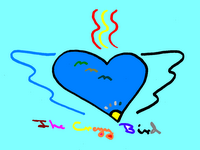[There is no internet where I be until after the 8th of July.
Until I get back, I leave you all with a small but somewhat convoluted essay penned by Elmer Eggplant, that incorrigible iconoclast, philosopher, autodidact theologian and critic of religion in the Third Galaxy which he referred to as the "Godbiz". Here, Elmer gets his dander up here about "faith" as compared to "belief".
For those of you not acquainted with the religions of the Third Galaxy, those known as "single 'tater" religions (mainly the Peelers, Mashers, Strugs and the Seeks) all teach that there is but a single deity they call the "Great Potato". Here begins Elmer Eggplant's essay]
The dominant religion in Arrogance, that of the Peelers, takes as revealed truth and fact that "salvation" only comes through Holy Idaho, the only besprouted Spud of the Great Potato. In order for the salvation thing to work, the Great Potato arranged for the sacrifice of His Only Spud, Idaho, who was "peeled", a gruesome form of execution used by the rulers of the Roamin Empire. On the third day, the lid of the garbage can blew off and Holy Idaho, His peelings intact appeared in all his glory and promised to Return one day and take his followers up to live with him in the Great Colander in the Sky -- from this came the name of the religion: "Peelers".
When I was a kid growing up in Poosah City, I remember seeing "Did you go to church last Sunday?" printed in letters 5 inches high on the benches at bus stops as well as giant billboards along the highway proclaiming, "Holy Idaho Saves!!!". People would sometimes demand to know, "Are you saved?", "Are you a Peeler?", "Have you accepted Holy Idaho as your Personal Savior?". That's how it was sometimes back in the Poosah City of my youth.
It's rather bizarre -- imagine if I went up to people and asked "Do you believe in sex?" or "What kind of orgasms do you have?" I would certainly deserve the negative reactions I would most likely get.
Similarly, people who think they are "spreading the word", deserve the comments they get. However, I know they take it upon themselves as a little martyrdom and ascribe the profanity they sometimes hear to "evil spirits".
As a matter of fact, back in those days in Poosah City, people were a hundred times less likely to ask or talk about sex than come on to you about religion. What passed for sex education back then could be summed up in the single phrase: "Boys have god-sticks and girls have shame caves."
What I am driving at is that, just as human sexuality is an expression of deep, intimate needs or drives, human religiosity is an expression of deep, intimate needs or drives -- in the latter case, the need or drive is to find meaning.
Where there is no meaning there is no hope and where there is no hope there is nothing but despair. To slightly misquote Dante: on the iron gates of hell, letters writ in barbed wire read, "Despair all ye who enter here!"
The function or "purpose" of religion is to bring meaning into an often chaotic existence. That said, religion(s) neither have nor give meaning in themselves. They are tools which, through rituals, sacraments, prayers and such, can help the practitioners of a religion to find or experience meaning in their daily lives. That is no small thing -- the wilderness out of which we evolved is a frightening place...
However, any tool can be misused and the sharper the instrument the more harm it can cause...
I have had the good fortune to spend most of my adult life in the Happy Little Kingdom. In their language they have a single word, "tro" which covers the meaning of at least two words in the language of Arrogance: "belief" and "faith". The word "tro" is also seen in our language as "truth" and "betrothal".
Having thought about this for a while, perhaps too much, I have concluded that one should distinguish more sharply between belief and faith than is commonly done.
For example, does a small child believe in the love of its parents? No! The child has faith that their love will be there. Or, in the Book of the Holy Idaho, Marc 17:20, where it is said, "Because the mustard seed has faith, it can grow into something so large that the birds of the air can sit in its branches..." The obvious corollary is that íf the seed only "believed" it could grow, it would quickly wilt and wither away...
Distinguish between belief and faith in this manner: Belief is generally quantitative, whereas faith is qualitative. That is to say, beliefs can be counted, but faith, if it can be measured at all, is measured by its strength.
Being a cantankerous old coot, I maintain that too many beliefs can be a sign of lacking or weakened faith. Beliefs have been behind some of the ugliest things people have imposed upon their fellow humans. I can't think of an instance that faith has ever engendered harm -- on the contrary!
All religions are human creations distilled from human experiences. That is to say, they have not been revealed -- that is, except in the sense that every thing in the manifest universe is imbued with the possibility of revealing ever deeper insights into the subtle nature of the underlying reality of What-Is as it unfolds into our experience of life.
None of the sacred or canonized texts were dictated by the "Great Potato" to "His prophets". No prophet in any literal sense was chosen and/or was called by Someone in the Great Colander" in the sky. The notion that any of these texts are infallible and immutable is not only ridiculous, it is dangerous and has been the source of much evil and human suffering.
If, for the sake of argument, I accepted that these guys were prophets in the sense it commonly understood, I'd have to say, "So? Does that mean that the misconceptions which spring forth in your mind like weeds when you read your prophets words have the same revelatory validity?"
For example, Masher, the founder of the Masher religion, supposedly read the Eternal Book. He is known as the "last and greatest of the prophets" and the transcriptions of his spoken words, The Reading, is sacred to the more than a billion Mashers with whom we share this poor world.
However, this Eternal Book, assuming its existence and that a mortal could read it, by its very nature, would present different readings according to the time, place and culture in which it was read -- and that is not even taking into account the personality of the reader. Such a book, being eternal, needs also be trans-dimensional -- but the reader of the printed transcriptions of the spoken word are mortal, which means their comprehension is limited by time and space.
If anyone has ever heard the word of the Great Potato, that would mean that we are all prophets -- because the Great Potato speaks to us all! True most don't listen, on the other hand those who do listen will to some degree have beans in their ears and be hearing echoes of their own mind. No religious message is absolute in itself.
From the little we know today of how the manifest universe developed over billions of years with the formation of galaxies, stars and planets; how, out of chaotic plasma and cataclysmic explosions, all the elements formed, including carbon with its amazing chemistry.
From the little we know of how life evolved on at least this planet, it seems that there is no way that life could not have begun, not only on this but on many other planets. Furthermore, it would appear to the observer that life has an innate tendency to develop sentience, then conscious awareness and, finally what Teilhard called "Point Omega".
Knowing all of this, which I admit is very little, I can't help having a very strong feeling that all of the religions are approximations of infinity of What-Is. That is why it is not practical to compare religions, in the sense of saying that this one is a "better" or "closer" or a more true approximation.
The reasoning for this is twofold.
First, the "angle" of each religion is, to some degree, unique to itself. Comparing religions is like comparing oranges and apples. Second, the approximation of a religion's "revelation" is, by definition, in relation to an unimaginable infinity.
Can we measure one approximation as being closer that another to an infinity on the order of the "Reality of What-Is"? I think not!
So, to sum it all up: I could not with a clear conscience say, "I believe in Holy Idaho" -- it would make as much sense to me to say, "I believe in Shoe".
I might be able to say, "I have faith in Holy Idaho", but I would feel more comfortable saying, "I have faith in Reality", or "I have faith in What-Is" -- but even then I'd feel kind of silly.
If you are comfortable with the religious tradition handed down to you and its practice fill your life with faith and meaning -- go for it! But please don't use the tenets of your religion to, so to speak, cut your neighbors' throat...
We are all orphans trying to find our way back to a home we have never known and parents we have never seen.
Sunday, June 29, 2008
Subscribe to:
Post Comments (Atom)




2 comments:
Well Done!
I was reminded of something while I read it. Have you seen this video?
The God Who Wasn't There
I think you'll like it.
As I sat listening to the "Godspell" (Gospel reading) last Sunday, I was reminded that the combination of Perceived Obsolesce and Planned Obsolesce, are actually the cornerstones of our economic existence.... Our faith that others can lead us out of the “Valley of Shadow of Death”, are simply the opportunists who are taking us there in the first place. The other irony I see, is to have faith that any one person elected, to the "Place That Once Had Honor" is the mindless thinking that continues to be that of the “Lemmings In Lockstep”.. Faith in our individual abilities to reason and think for ourselves, puts us in a much better position to make our own life’s decisions and to nurture “The Peace That Surpasses All Understanding”.
Nuke Watcher
Baltimore,MD.
Post a Comment